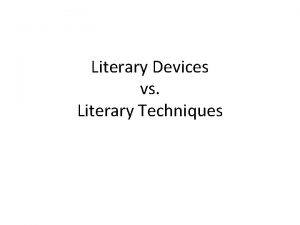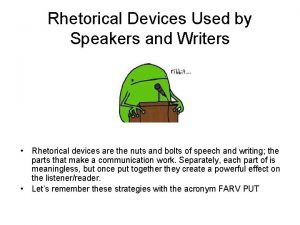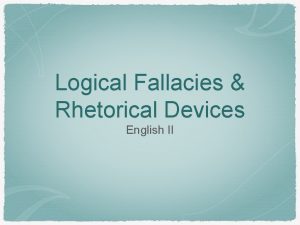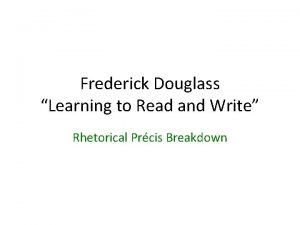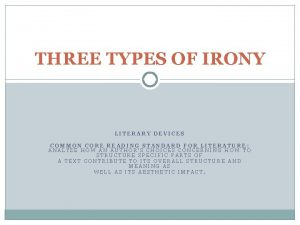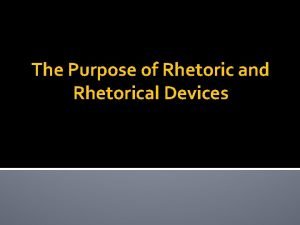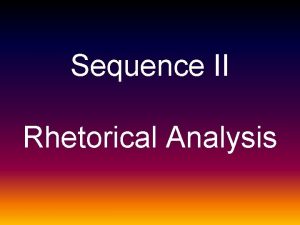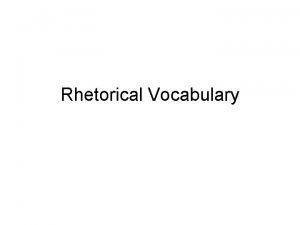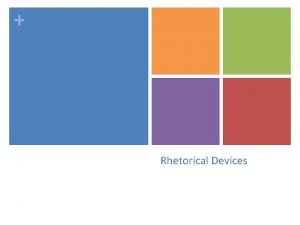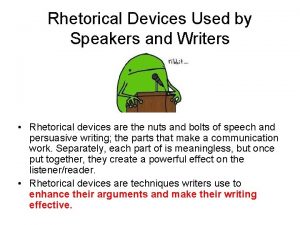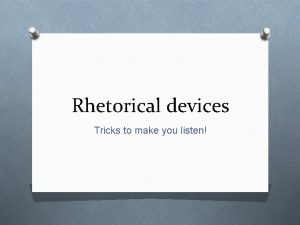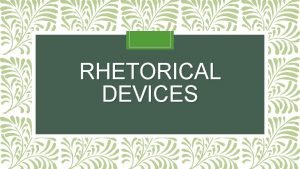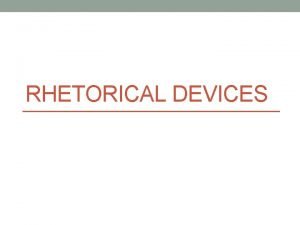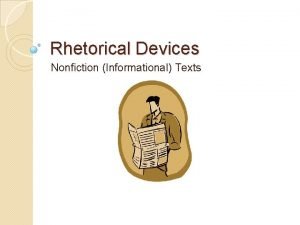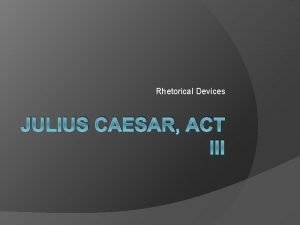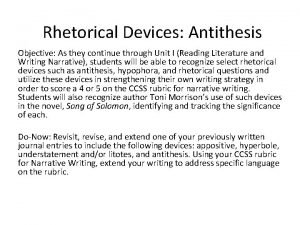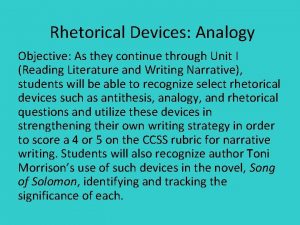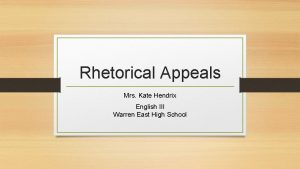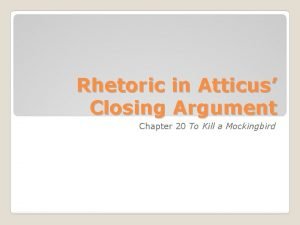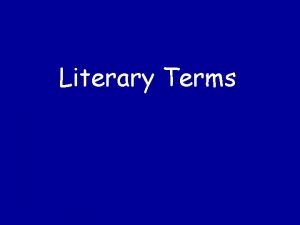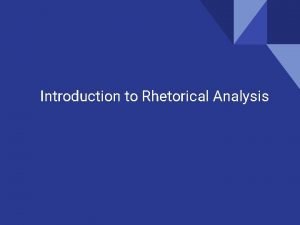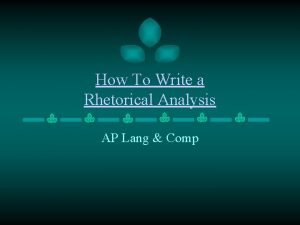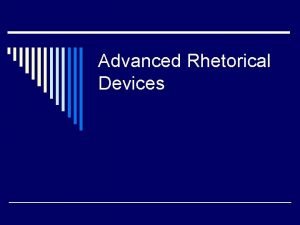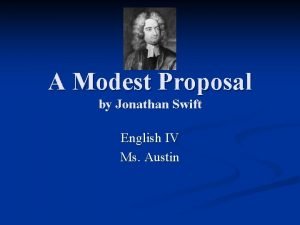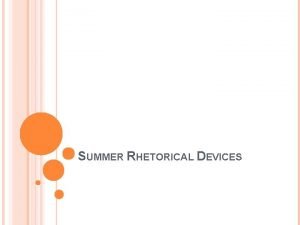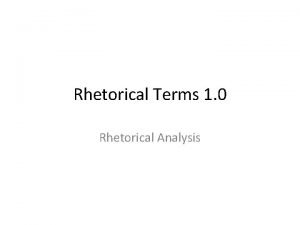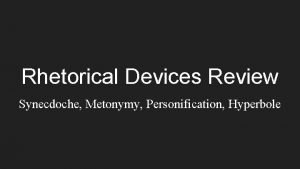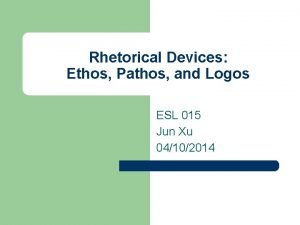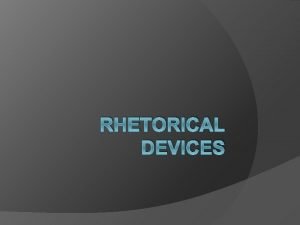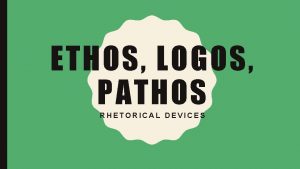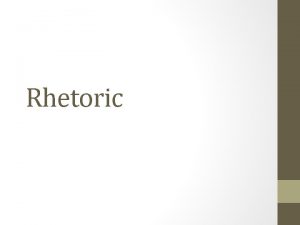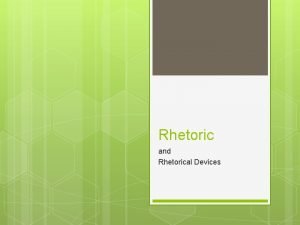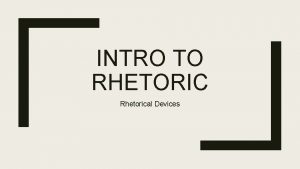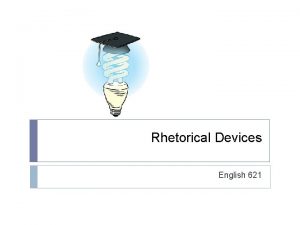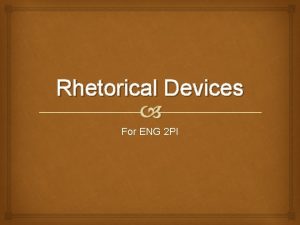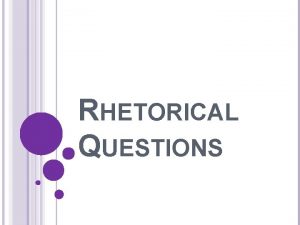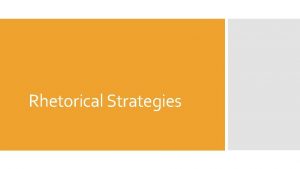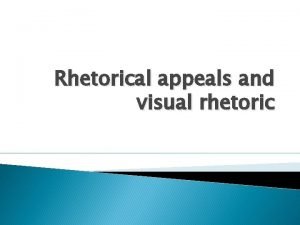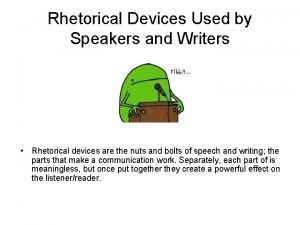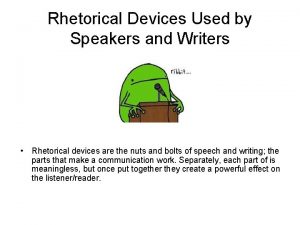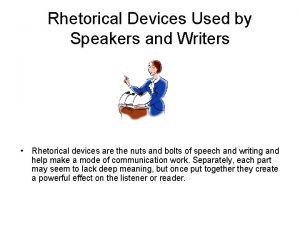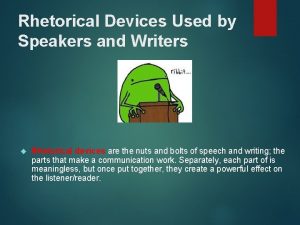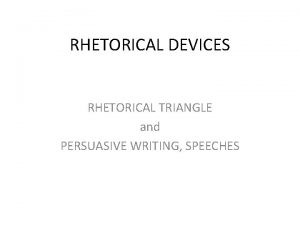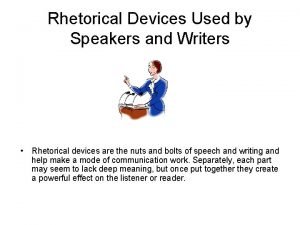Rhetoric and Rhetorical Devices What is Rhetoric The






























- Slides: 30

Rhetoric and Rhetorical Devices

What is Rhetoric? • The skill of choosing words that are most effective for persuading or for creating visual images in the listener’s or reader’s mind.

3 Categories • Pathos (Emotional) • Ethos (Ethical) • Logos (Logical)

Pathos • This type of appeal attempts to persuade the reader or listener by appealing to the senses and emotions. • Usually include statements with vivid sensory details, which are used to awaken the senses and perhaps manipulate the emotions of the audience. o Political ads that show politicians kissing babies or shaking hands with the elderly often appeal to the emotions.

Ethos • This type of appeal attempts to persuade the reader or listener by focusing on the qualifications of the speaker. • The speaker’s credibility is paramount in an ethical appeal. • Ethical appeals focus more on the speaker even more than the situation.

Examples of ethical appeals • Celebrity endorsements • A teen’s argument that he or she should be allowed to do something because he or she has never been in trouble, or because his or her friend is a perfect citizen and so on.

Logos • This type of appeal attempts to persuade the reader or listener by leading him down the road of logic and causing him to come to his own conclusion. • Logical appeals state the facts and show facts are interrelated. • If/then statements are examples of logical appeals. • Logical appeals are often used in courtroom situations.

RHETORICAL DEVICES

ANAPHORA • Repetition at the beginning of two or more successive verses, clauses, lines, or sentences. • • I have a dream that one day this nation will rise up and live out the true meaning of its creed: "We hold these truths to be self-evident, that all men are created equal. " I have a dream that one day on the red hills of Georgia, the sons of former slaves and the sons of former slave owners will be able to sit down together at the table of brotherhood. I have a dream that one day even the state of Mississippi, a state sweltering with the heat of injustice, sweltering with the heat of oppression, will be transformed into an oasis of freedom and justice. I have a dream that my four little children will one day live in a nation where they will not be judged by the color of their skin but by the content of their character.

Aphorism • A concise statement of truth (principle). • If you always do what you always did, you will always get what you always got. " (Jackie "Moms" Mabley) • Your children need your presence more than your presents. " (Jesse Jackson) • "I disapprove of what you say, but I will defend to the death your right to say it. " (often attributed to Voltaire, the words are in fact Tallentyre's summary of Voltaire's attitude toward Helvetius after the burning of the latter's writings)

Parallelism • The use of repeated grammatical structures. • a noun is listed with other nouns, an -ing form with other -ing forms, and so on. o Immature poets imitate; mature poets steal. " (T. S. Eliot, "Philip Massinger, " 1920) "O well for the fisherman's boy, That he shouts with his sister at play! O well for the sailor lad, That he sings in his boat on the bay!" (Alfred Lord Tennyson, "Break, " 1842) "Today's students can put dope in their veins or hope in their brains. If they can conceive it and believe it, they can achieve it. They must know it is not their aptitude but their attitude that will determine their altitude. " (Jesse Jackson)

Allusion • A direct or indirect reference to something from history, the Bible, etc. • Allusions engage the reader and will often help the reader remember the message or theme of the passage. • Allusions allow the writer to give an example or get a point across without going into a lengthy discourse.

Examples of Allusions • “I was surprised his nose was not growing like Pinocchio’s. ” This refers to the story of Pinocchio, where his nose grew whenever he told a lie. It is from The Adventures of Pinocchio, written by Carlo Collodi. • “When she lost her job, she acted like a Scrooge, and refused to buy anything that wasn’t necessary. ” Scrooge was an extremely stingy character from Charles Dickens’, A Christmas Carol.

Rhetorical Questions • A question for which the answer is obvious. • A response is not necessary. o “Why are you so stupid? ” o “Why me? ”

Argument by Analogy • A comparison of two similar situations, implying that the outcome of one will resemble the outcome of the other. • There might be life on Europa because it has an atmosphere that contains oxygen just like the Earth. • This novel is supposed to have a similar plot like the other one we have read, so probably it is also very boring. • The universe is a complex system like a watch. We wouldn't think that a watch can come about by accident. Something so complicated must have been created by someone. The universe is a lot more complicated, so it must have been created by a being who is a lot more intelligent.

Others • Similes and Metaphors • Irony • Imagery • Syntax • Quotes

What is Irony? Irony is about expectations. Irony: the opposite of what is expected. 3 kinds of irony • Verbal • Dramatic • Situational

Verbal Irony A character says one thing but means the opposite Also called sarcasm or being sarcastic. Examples The locker room smells really good. Awesome! Another homework packet!

Dramatic Irony When the reader understands more about the events of a story than a character. You know something that a character doesn’t. Example Tim’s parents are proud of the “A” he got on the test, but we know he cheated. Alex writes a love poem to Judy but we know that Judy loves Devin.

Situational Irony When what actually happens is the opposite of what is expected. Something about the situation is completely unexpected. Example General Sedgwick’s last words were, “They couldn’t hit an elephant at this distance. ” Bill Gates uses an Apple computer.

Review Something that is ironic is unexpected. If unexpected by a character, it’s dramatic. If unexpected by everyone, it’s situational. If it’s sarcasm, it’s verbal.

Syntax

Sentence Purpose • Declarative- makes a statement • Interrogative- asks a question • Exclamatory- provides emphasis or strong emotion • Imperative- gives a command

Sentence Length • Telegraphic- sentences shorter than 5 words in length • Short- sentences approximately 5 words in length • Medium- sentences approximately 18 words in length • Long- sentences 30 words or more in length

Sentence Structure • Simple- one independent clause • Compound- two independent clauses joined by a coordinating conjunction or semicolon • Complex- an independent clause and one or more subordinate clause • Compound-complex- contains two or more independent clauses and one or more subordinate clauses

Cumulative (or loose) • Makes complete sense if brought to a close before the actual ending o We reached New York that morning after a turbulent flight and some exciting experiences, tired but exhilarated, full of stories to tell our friends and neighbors.

Periodic • Makes sense fully only when the end of the sentenced is reached o That morning, after a turbulent flight and some exciting experiences, we reached New York.

Balanced • The phrase or clauses balance each other by virtue of their likeness of structure, meaning or length o. He maketh me to lie down in green pastures; he leadeth me beside the still waters.

Sentence Order • Natural- involves constructing a sentence so the subject comes before the predicate o. The group sat beside the swimming pool.

Inverted • Involves constructing a sentence so the predicate comes before the subject. This can create an emphatic or rhythmic effect o. Beside the swimming pool sat the group.
 Literary devices techniques
Literary devices techniques Rhetorical devices
Rhetorical devices Parallelism rhetorical devices
Parallelism rhetorical devices Rhetorical devices vs logical fallacies
Rhetorical devices vs logical fallacies Learning to read and write frederick douglass analysis
Learning to read and write frederick douglass analysis Irony in poetic devices
Irony in poetic devices Repetition rhetorical devices
Repetition rhetorical devices Five classical canons of rhetoric
Five classical canons of rhetoric Foldable vocabulary
Foldable vocabulary Inclusive language rhetorical device
Inclusive language rhetorical device Enumeration rhetorical device
Enumeration rhetorical device Disney songs with rhetorical devices
Disney songs with rhetorical devices Examples of rhetorical devices in i have a dream speech
Examples of rhetorical devices in i have a dream speech Stylistic device symbol
Stylistic device symbol Difference between anaphora and parallelism
Difference between anaphora and parallelism Rhetorcal devices
Rhetorcal devices Antistrophe example
Antistrophe example Aristotle rhetorical devices
Aristotle rhetorical devices Antithesis rhetorical device
Antithesis rhetorical device Rhetorical device
Rhetorical device Kahoot rhetorical devices
Kahoot rhetorical devices What chapter is atticus closing argument
What chapter is atticus closing argument A speaker who uses vivid imagery
A speaker who uses vivid imagery Lidds acronym
Lidds acronym How to write a rhetorical analysis essay ap lang
How to write a rhetorical analysis essay ap lang Amplification sentence examples
Amplification sentence examples Satire rhetorical devices
Satire rhetorical devices Rhetorical devices allusion
Rhetorical devices allusion Examples of juxtaposition
Examples of juxtaposition Synecdoche
Synecdoche Ethos rhetorical device
Ethos rhetorical device
